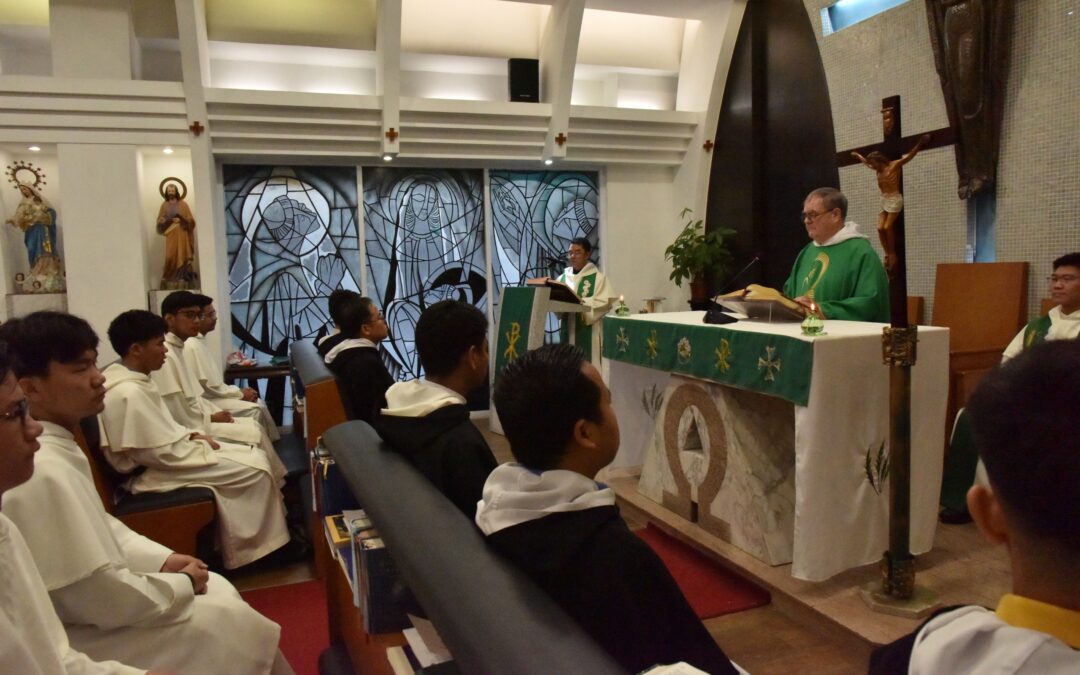
Vocation Discernment and Blessed Jordan of Saxony


20 January 2026
Five brothers from our Dominican community in Macau, namely, Rolindo Tilman, Xaverio Boe, John Ai, Peter Nyi and Ephraim Nay, renewed their religious profession on Tuesday, 20th of January 2026. The event took place within our conventual Mass, presided over by the Prior, Fr. Javier Gonzalez, and con-celebrated by Frs. Hilario Plureh, Lawrence The Reh, Paul Fan and Martin Bai, members of this community of St Dominic’s. Witnesses of the ceremony were all our student brothers, plus a few Sisters and Lay Dominicans who come regularly to our chapel.
In his homily Fr. Javier stressed the point that our religious vocation is a gift from God. He is the one calling and choosing those He wants, based on His own initiative and reasons. “Not as man sees does God see, because he sees the appearance but the Lord looks into the heart” (1 Sam 16:7). Hence, our response cannot be other than sincere gratitude, day-to-day fidelity and (sacrificial) obedience to Him. The Prior invited all those present to pray for the five brothers and to spiritually renew also their own profession.
At the end of the Mass, some pictures captured the spirit of this joyful event–meaningful not just for the five brothers, but also for the community and for the entire Province. Warmest congratulations to our brothers!
Christmas originated as a Christian celebration of the birth of Jesus Christ in Bethlehem, observed on December 25. The date was first mentioned in the third century, coinciding with Roman winter festivals to symbolize light triumphing over darkness. Over time, Christmas embraced traditions from many cultures, such as gift-giving, carols, and evergreen decorations.
The meaning of Christmas is both religious and cultural. For Christians, it represents hope, salvation, and God’s love revealed through the incarnation of Jesus. For many others, it has become a season of joy, generosity, and togetherness, marked by family gatherings, festive meals, and the exchange of gifts.
This year, 2025, our community Christmas celebration started in our chapel at 10:00pm with the ‘Midnight’ Mass, attended by a good number of the faithful and the Dominican Family (Sisters and Lay members). The Chapel had been beautifully decorated by our student brothers, who also filled it with their voices during the Eucharistic celebration in honor of the Nativity of the Lord. Afterwards, we shared joy and fellowship over simple food. We sang songs together and enjoyed a small but heartfelt celebration that lasted until midnight. It was a truly memorable and uplifting experience, filled with warmth and gratitude.
Merry Christmas to everyone, and a Happy New Year to all! May this coming year 2026 bring peace to our hearts, prosperity to our endeavors, and happiness to our families. May love and kindness guide us, and may the light of Christmas continue to shine brightly in our lives throughout the year.
On December 30, 2025, we enjoyed a community sports day. It was part of our Christmas celebration aiming to foster our bonding.
We competed among ourselves in table tennis, basketball, badminton, and football.
By working together as teams, we deepened our family spirit in a day filled with laughters and sweats. Although the Holy Spirit is the basis of our communion, yet through our engagement in our common interest of sport, we indeed grow in mutual appreciation and love.
“The brothers should gladly join in community recreation, by means of which mutual understanding and brotherly communion are developed” (Book of Constitutions and Ordinations of the Friars of the Order of Preachers, #5).
On the feast of St. Albert the Great, November 15th, 2025, our studentate celebrated the accomplishment of Father Paul’s term as our Master of Students; and at the same time, the welcoming of Father Hilary, as our new Master. We thank Father Paul for his hard work and silent dedication during the past years to each of us, especially in our trials. We thank God for him. We continue praying for him in his new mission in Spain, as he will also keep us in his prayers.
Likewise, we express our heartfelt welcome to our new Master, Father Hilary. He has recently finished his doctorate at the Angelicum, in Rome. As a member of the very first batch of Dominican vocations from Myanmar who studied Theology in Macau, Father Hilary is now committed to walk with us in our good and bad times, as a brother. We are grateful to him for his generous acceptance of this office and pray that the Holy Spirit enlighten him to guide us.
We also added to the joy of that day the joint birthday celebration of some brothers of the community, as well as the welcoming of Father Martin Bai into our community.
May God continue showering his blessings upon this studentate community in Macau!